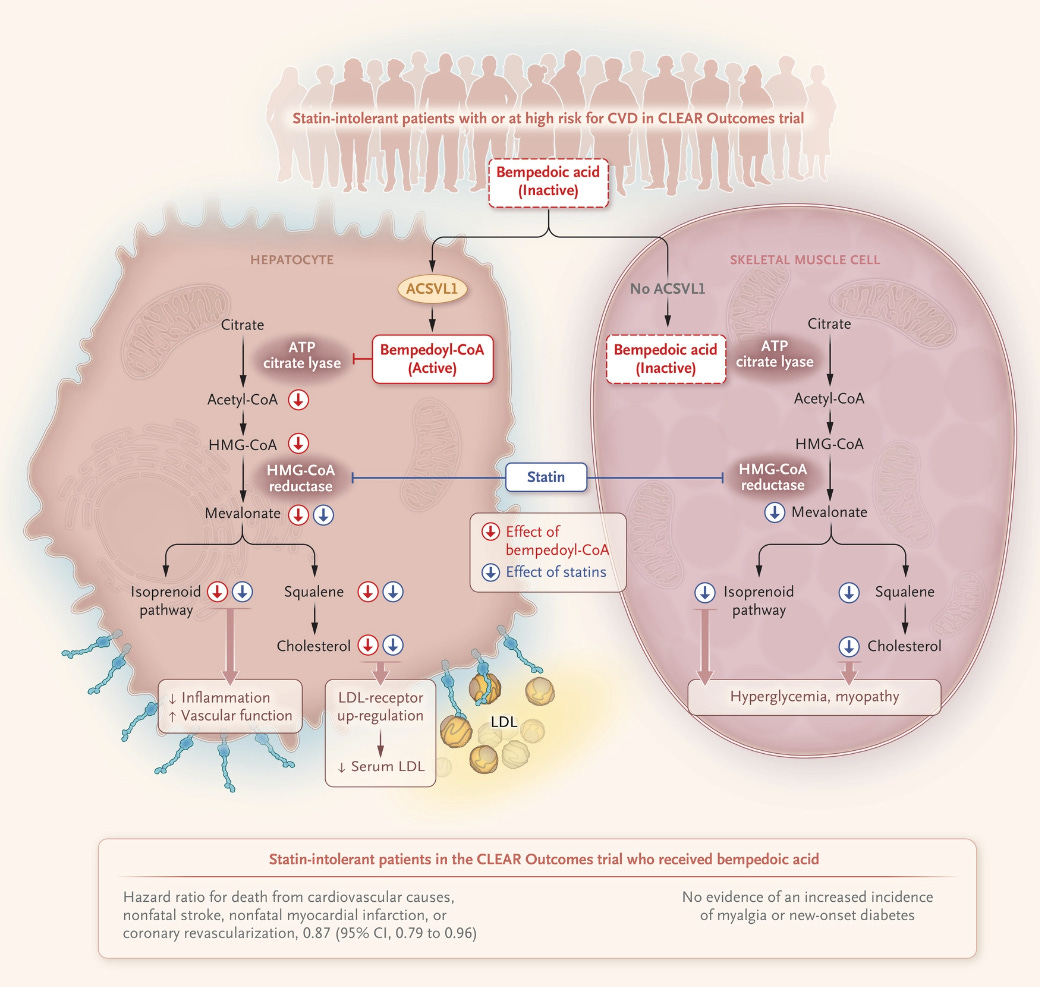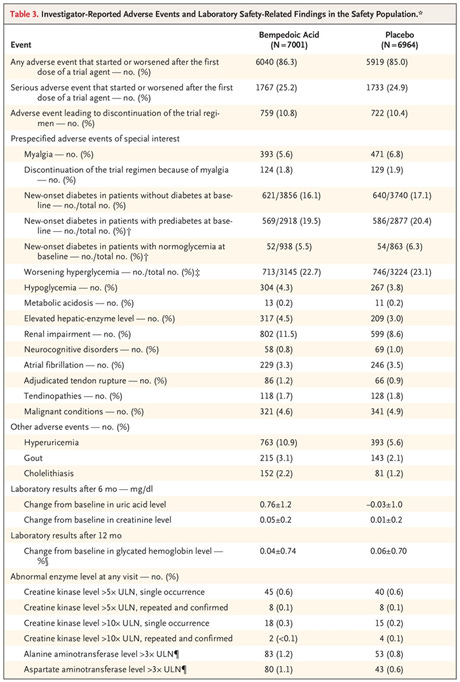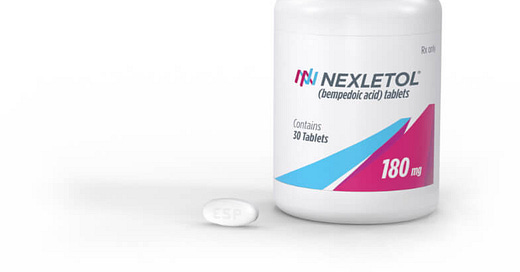A new statin alternative... how good is bempedoic acid?
Heart disease is the number 1 cause of death in America, but it doesn’t have to be.
We know a huge amount about how to lower cardiovascular risk, but executing on that is really hard in practice.
While much of the media was covering the scary reports about artificial sweeteners causing heart disease (more to come in this newsletter on that topic soon), a brand new study on a statin alternative to reduce heart disease was presented at the American College of Cardiology Conference.
You’ve probably read in this newsletter that I think statins are pretty incredible drugs.
But for reasons that I can’t fully explain, statins are also among the most hated drugs in the world (or at least on the internet).
There isn’t a topic besides Covid vaccines that gets my patients as riled up as statins do - I’ve been repeatedly surprised by the veracity of a negative response from patients about them.
Statins have pretty clear risks that can be mitigated
The risks of statins seem pretty clear to me. Statins cause muscle aches (myalgias) in about 9% of people who take them.
They lead to a mild increase in blood sugar and a very slightly increased risk of diabetes (although if you get diabetes from a statin, you were probably just one or two Snickers away from getting it anyway).
The other concerns - cognitive dullness, depression, Alzheimer’s, memory loss - remain amorphous and difficult to study or quantify.
But for most people, the risk of vascular dementia (dementia from strokes or vascular disease) or Alzheimer’s (which is increasingly thought to have a vascular component) is orders of magnitude higher than the risk of dementia from taking statins.
In other words, statins are probably protective against dementia for the majority of people.
And so don’t read that to mean I am dismissing the experience of my patients who feel cognitively sharper after stopping their statins - an intervention can have a population-wide benefit and still be problematic for an individual.
If you’re statin-intolerant (you’ve had a side effect from taking them) or statin-resistant (you have no interest in taking one because of the side effect profile), then a non-statin medication to lower heart disease risk is appealing.
Enter bempedoic acid, brand name Nexletol
Bempedoic acid, or Nexletol, has been an object of excitement in the cardiovascular prevention world since it was approved last year. For the record, I was opposed to the fact that it was FDA approved before we had data to show that bempedoic acid actually reduced heart attacks and strokes.
But I was in the minority, as big names in the world of lipids have been bullish on bempedoic acid as a statin alternative for quite a while:


In theory, this drug seems great - it lowers lipid levels and doesn’t have the impact on muscles that statins do.
Bempedoic acid works to block cholesterol synthesis, which means that the liver needs to take more cholesterol out of circulation to fulfill its biological requirements. This is why bempedoic acid (and statins) lower LDL-C and thus lower cardiovascular risk.
Bempedoic acid is a pro-drug, which means it needs to be converted to its active form before it works.
The enzyme that does this conversion doesn’t exist in muscle cells, which is why the activity of bempedoic acid is in the liver, where it can’t cause muscle aches:

Bempedoic acid does what we were hoping it would do - reduce heart attacks for people with elevated LDL cholesterol levels
The CLEAR Outcomes trial studied a group of patients who were “unable or unwilling to take” statins and randomized them to bempedoic acid or placebo.
The folks who took bempedoic acid had a drop in their LDL cholesterol numbers which was good but not great:

But the results here were certainly positive - it looks like bempedoic acid works:

We usually measure effectiveness in this trials with something called a “composite endpoint” which is a combination of heart attacks, strokes, need for stents, death from cardiovascular disease, and overall death.
Bempedoic acid certainly reduced heart attacks and strokes as well as the need for stents or cardiac procedures - that’s why we see a benefit in the composite endpoint above.
It’s interesting to note, though, that just because it reduced heart attacks and strokes didn’t mean a reduction in death from cardiac causes or death overall:

The most likely explanation of why bempedoic acid didn’t reduce death is that we didn’t follow the patients long enough to see the eventual reduction in death that would happen from preventing heart attacks and strokes
But the other concern is that there are off target effects that may cause other problems, like worsening kidney function, elevated liver enzymes, or higher risk of gout, all of which we saw in this trial:

In summary - bempedoic acid is a good drug, but it isn’t a great one
Looking at the results of this trial, I think that the risk-benefit discussion with bempedoic acid means that I’m unlikely to be prescribing it very often.
There are 4 major factors at play here for me:
Most patients do well on statins, and effective statin treatment lowers numbers more effectively than bempedoic acid.
We have two other drug classes that work to reduce cardiovascular events in patients who may not be able to take statins - PCSK9 inhibitors and ezetimibe.
The LDL-C reduction for bempedoic acid just isn’t that impressive (the authors didn’t report apolipoprotein B, even in the supplementary appendix). And bempedoic acid is not a life saving drug, as I discussed above.
I’m concerned about some of the side effects of this drug with regards to liver tests, kidney function, and uric acid, all of which are signals that we don’t really see with either PCSK9 inhibitors or ezetimibe.
The end result here is that we have a drug that doesn’t really impress me, at least when used by itself.
The most compelling use case for bempedoic acid is as part of combination therapy, to get numbers down to goal without maxing out doses of any individual medication, hopefully limiting side effects.
Now, there is certainly a subset of patients who would benefit from bempedoic acid monotherapy, particularly the ones who are statin intolerant.
The way that I treat heart disease in practice, particularly for people who have a history of heart attacks or strokes, is that I often use multiple classes of drugs to get the numbers down to optimal levels.
For people with established vascular disease, it really does seem like the lower the better - an apolipoprotein B level of 35 mg/dL has been proposed as an inflection point above which cardiac risk increases.
And so while bempedoic acid is another tool in our toolbelt, I’m not anticipating using it much, at least based on the data that we have so far.




